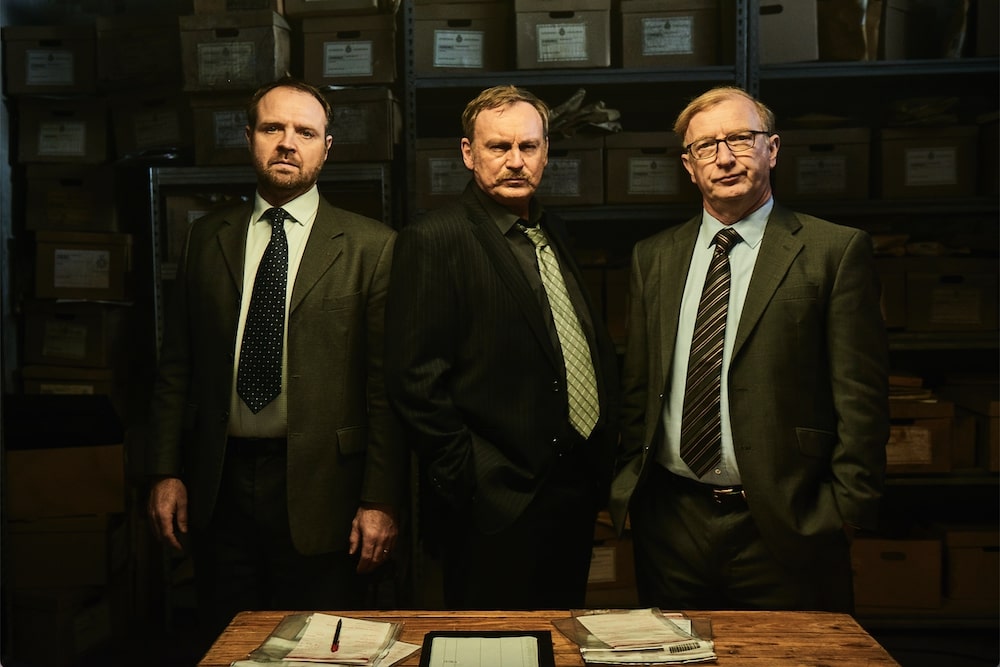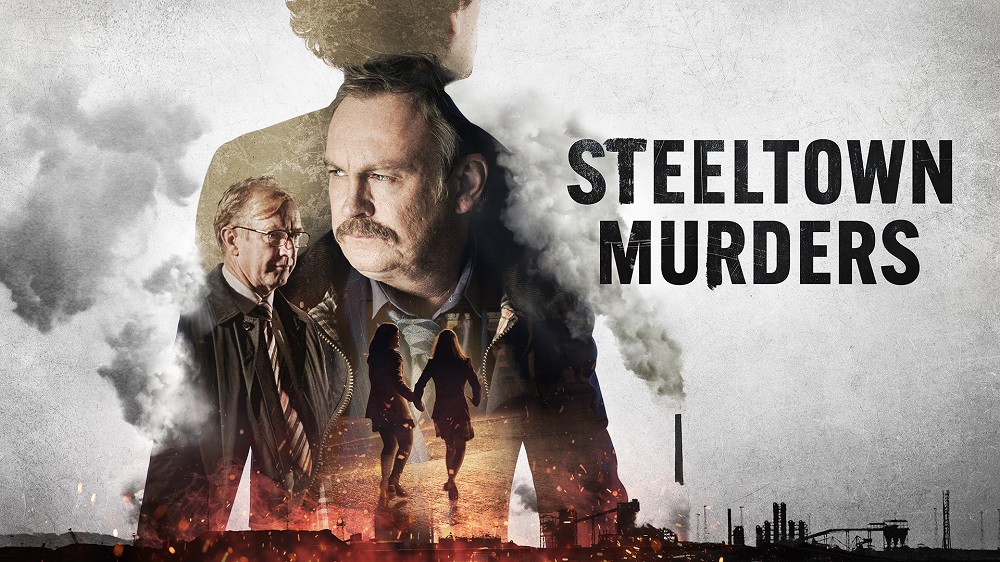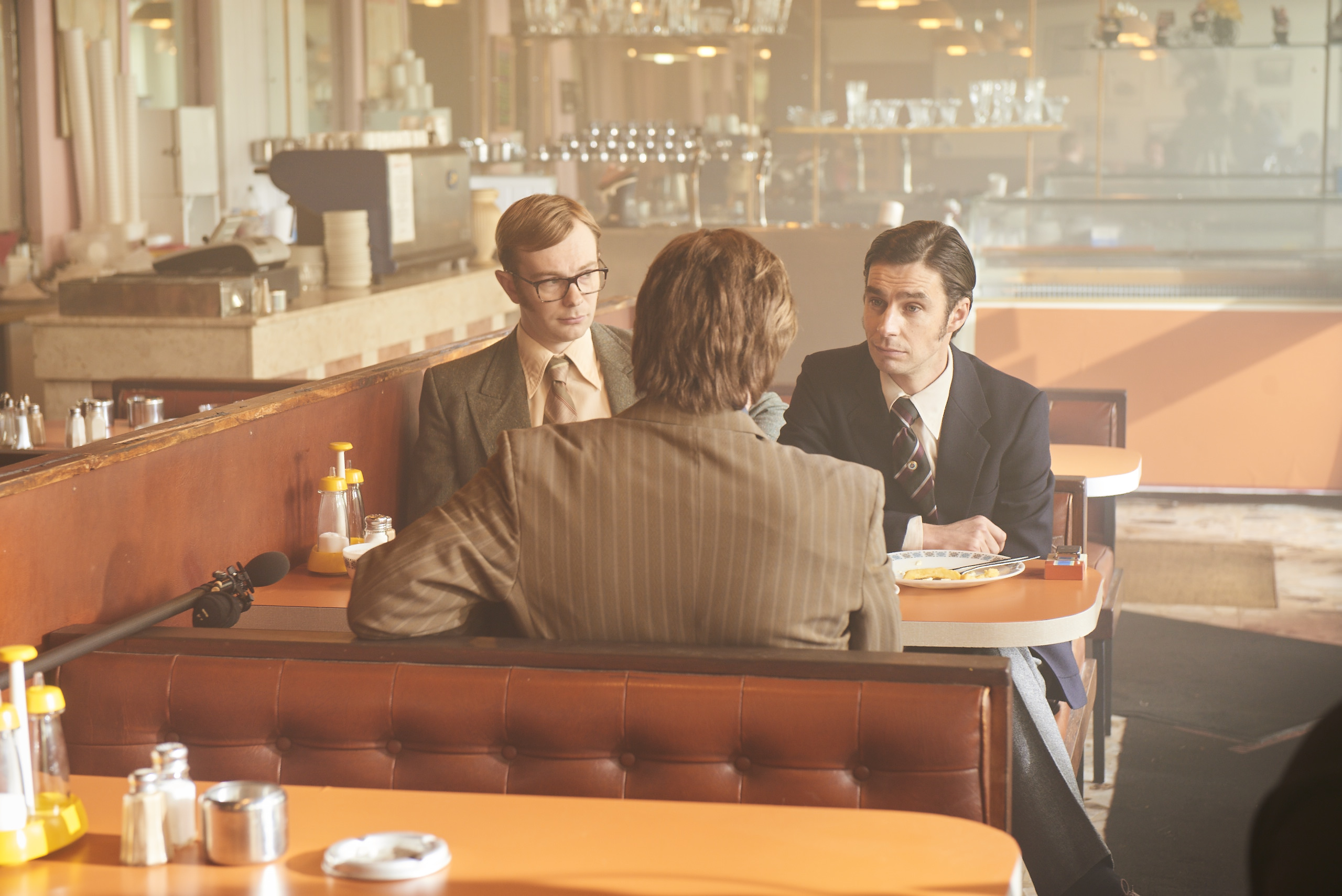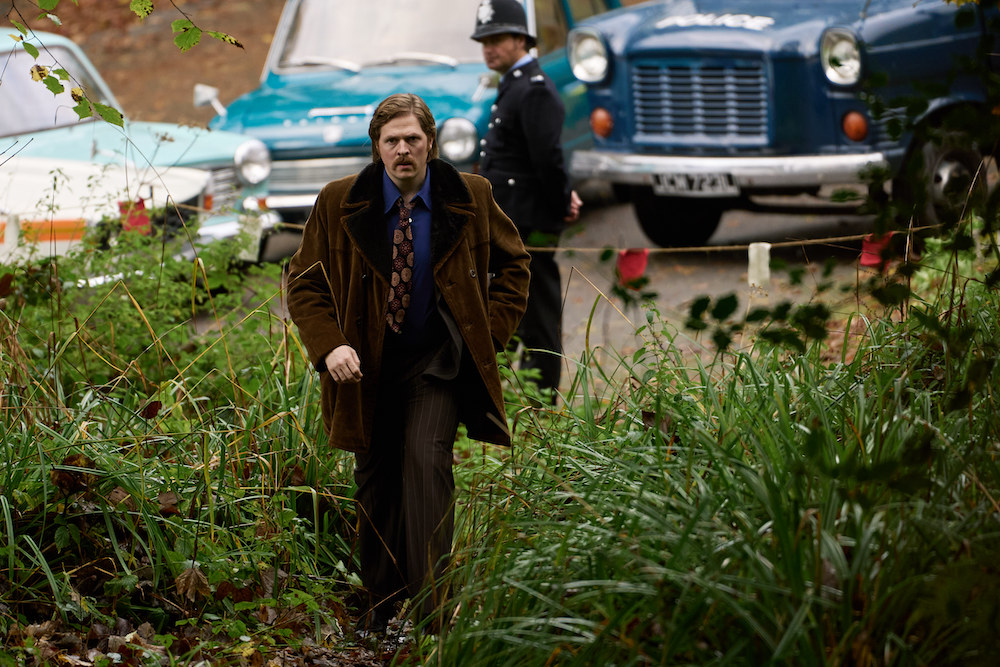Steeltown Murders: Interviews with the cast of pioneering BBC drama

Set in both 1973 and the early 2000s, Steeltown Murders centres on the hunt to catch the killer of three young women in the Port Talbot area and the remarkable story of how – in the first case of its kind – the mystery was solved almost 30 years later using pioneering DNA evidence.
Contrasting the policing methods of the 1970s with the forensic breakthroughs of the early Noughties, Steeltown Murders is a portrait of a town dealing with the repercussions of an unsolved case three decades on, and asks if justice can ever truly be found.
Produced by Severn Screen for the BBC, Steeltown Murders is written by Ed Whitmore and directed by Marc Evans (The Pembrokeshire Murders, Hinterland), with Hannah Thomas (Hidden, I Am Not a Witch) serving as producer in association with All3Media International.
The cast includes Philip Glenister, Steffan Rhodri, Gareth John Bale, Keith Allen, Priyanga Burford, Sharon Morgan, Siôn Alun Davies, Scott Arthur and many more.
Steeltown Murders begins at 9pm this evening on BBC One, with all episodes then available on BBC iPlayer.

Interview with Philip Glenister (DCI Paul Bethell, 2002)
What first attracted you to this script?
The first thing, as always, is the writing. I found it a very, very powerful piece by Ed Whitmore. There were a number of reasons but that’s the main one. Amongst other things, I wanted to work with Marc Evans because I think he is fabulous. And I wanted to check out the Welsh side of me because I am half Welsh, my parents live in Wales.
Can you tell us about the two time periods covered in the drama?
I have been in a couple of dramas in both periods, Life on Mars in 1973 and then I did Clocking Off which is in 2001. I had a look at some of the old Clocking Off’s on iPlayer to see what I was wearing for the period. Isn’t that mad? It just seemed like yesterday.
What’s it like to be part of a real life story?
I think it’s a responsibility and it’s a privilege. It’s interesting because I haven’t played a policeman since Gene Hunt in Ashes to Ashes. I am so aligned with that role, so it’s really – not to use the word exciting, but – I wanted to play another policeman and this was totally the opposite to Gene Hunt in many respects. Paul Bethell is a real person and Gene Hunt is fictional. I think the overall feeling is that it’s a responsibility to serve the story because there are obviously family members. We have to serve the story and them above all and respect them. I think respect is the word.
When it’s based on something that is real and so traumatic because it involves three teenage girls, and having daughters myself, it hits you. It’s unimaginable what the families have gone through. I haven’t sort of looked at it as a thriller, to me, it’s more a drama-documentary that we are making. You want it to be entertaining, educational and informative, all the things you want in a good drama. So, hopefully we have done it justice.
Paul Bethell is close to this project and has been on set, what’s that like as an actor?
It’s really nice actually because he is so laid back. Paul is such a nice guy, when I first met him before we started shooting, we had dinner together, a few of us. It was great to be able to ask him a few questions. I don’t get too bogged down with ‘what are your mannerisms like’ and all that, I am not so much interested in that, rather his thoughts on how he worked on the case. He told me something which I thought was really interesting, he said he didn’t like using the word closure, because in a case like this there is never closure, especially for the family. There is hopefully a sort of peace of mind that you eventually get the whole story. You know what happens, you know who did it, but you never get closure from what these families have suffered. So, he never used the word closure, particularly to them.
What has it been like working with your fellow cast members?
What I have noticed about being in this production and filming in Wales is how close everybody is. Everybody knows each other, I feel like I am gate-crashing the party. But they have been so welcoming and nice to me. I told them I support Wales in rugby, couldn’t actually say it for football, but rugby definitely, always have done. It’s been a really, really enjoyable experience for me.
How would you sum up Steeltown Murders?
That’s a tough one. I would say it’s an incredibly powerful, moving story where out of the darkness, hopefully some light appears.
What was it like performing the accent?
I went through a few scenes with my mum actually. But I picked a couple of wrong scenes that were a bit sort of sweary. She said ‘what in God’s name are you doing?’ and I said, actually I will find another scene mum, don’t worry…

Interview with Steffan Rhodri (Phil ‘Bach’ Rees, 2002)
What first attracted you to this script?
I am from really near where it happened actually. I was a bit young to really remember it, but my school was about a mile from the woods where two of the murders happened. I just had a sense of adults talking about it, it was something I was sort of aware of.
I certainly think these horrific crimes changed the whole atmosphere of an area. Temporarily it caused a lot of fear but in the long term as well, in terms of how much freedom young people had.
It is a true story, does that change the way you approach the role?
As soon as I read the script, I saw the respect. I think that if you are going to be doing stories like this, there has to be cooperation and the respect of the people involved.
Some of the real-life people involved have been on set, as an actor is that useful?
It was certainly useful for me to meet the real Phil Rees, it was fascinating to meet him. It’s priceless really, you can go all around the houses trying to think of character choices, but you just have a conversation with the real guy for half an hour and I got an insight of him. He is a really nice guy. I got the sense of decency, respect morality and that he wanted to do this for all the right reasons, it just oozes out of him.
I have worked with Marc Evans before and I played a sort of similar character. Straight copper, doing his work diligently for the right reasons to bring justice for people who have been affected by crime.
How important is authenticity in this production?
I am really looking forward to seeing the complete 1970s period because the authenticity of our scenes in 2002 is faultless. In studio, a lot of the design detail that we use is a 2002 version of a shut off series of offices and store rooms from 1973. It has got a sort of double time thing going on.
I am not an actor who watches back but sometimes you get a glimpse of a still or something and the lighting just looks incredible and I am excited to see it actually. And to work within it, everything feels so authentic in terms of design, props and costume. I think the script suggests that as well, the script is incredibly accurate and detailed. There is nothing glossed over or approximated, the research is there to have the required detail, that feels very important to put across.
What has it been like working alongside your fellow cast members?
I had never met Phil Glenister before, I think we just hit it off straight away, we get on great. Gareth I have known for a while, I actually directed him in a youth theatre production many years ago, when he was like 15. You can’t get much more authentic than a guy playing his own uncle with the same surname in a drama set years later, he is the real deal. Actually, in script terms he is a great foil as well and a great script device because it allows me and Phil to have a great shorthand; two guys who have known each other for 30 years, but then we have someone who we kind of have to keep in the loop. That’s a great dramatic device obviously because then we have to give some exposition to him and we have someone to do that with rather than falsely do it with each other which wouldn’t seem right. That really helps tell a story, I think.
Did you enjoy the role because it is part of a Welsh story with authentic Welsh voices?
Yes, definitely, I have loved working on it. I think Phil is a bit more of an outsider even though he is half-Welsh and is the authentic deal in that sense but hasn’t worked or lived in Wales as much as I have. He must look on it bizarrely with me because any guest actor coming in I was either in school with or youth theatre with or did theatre education 25 years ago or whatever. Pretty much every actor who has come in I have been like ‘Oh, hi how are you doing?’. That’s the kind of community that Wales is really, we all know each other and our paths cross in different ways.
How would you sum up the series?
I’d say it’s an important story to tell in terms of showing a long-term respect for victims of crime. And unlike some stories it gives respect to those victims and honours them. But it also does something which is not always fashionable which is honour good, old fashioned policing and crime solving through diligence and open-mindedness, I think that’s important to show.

Interview with Scott Arthur (DCI Paul Bethell, 1973)
Does playing a real-life person change things for you as an actor?
Yes, I think from an actor’s perspective, a lot of work is done for you. You are playing real people with real histories, real families, real connections; there is a lot to take away from that.
Does the authenticity of the sets help your performance?
It’s a space that in a normal world as a human being you would never get to see. We always watch TV shows and period pieces and wonder what that world is like. But when you do step into it you are transformed in a time machine almost. The work that the team has done to get those minor details right is a dream as an actor. You are transported straight away, as soon as you walk on there.
What can you tell us about your role?
Paul isn’t where he would be, he is a DC in South Wales in the Port Talbot rank. He kind of feels a responsibility with this case anyway, he should be at the forefront of it. Unfortunately, he gets put on the taping – going to a car or someone’s home, getting Sellotape, sticking it against a sofa or a car seat and taking the fibres off, and then recording them. But he wants to be at the frontline. He feels as if, if he was allowed at the front of this investigation alongside the top rank officers that he could help, that he could really make this case one that could be solved tomorrow because the difference between my Paul and Phil Glenister’s Paul is that there is a lot of energy and hope from my Paul. He believes that in the next week they can catch this killer, whereas with Phil’s Paul there’s a lot of trauma, he feels as if they failed back in the seventies. The only evidence they had was that the suspect had an Austin 1100, it was – the only credible kind of evidence that they had. He is kind of like this young puppy almost and wants to get to the forefront of this investigation. It’s a privilege to play him and I have met Paul and his wife Karina and they are amazing people.
Does that help when you meet the real person?
Yes and no, it depends. Myself and Phil look nothing like Paul Bethel, he certainly has a different energy to us. It was good to meet him and pick his brain – the routes he would go down or the little things he would do. For instance, Paul told me that when they were in incident room and someone would come in with some evidence or a photograph or a piece of paper with information on it, they put it up on a wall, Paul would look at it and then two minutes later would just adjust it slightly. Kind of putting his own stamp on things. Little things like that you can take from the real person.
What’s it like knowing there is another actor playing your older self?
Phil is lovely, we met the night before the first day. Actually, I was very intimidated because I think Phil is a wonderful actor. Phil and I have shared information and helped each other. It was quite nice actually because when we were filming, he said good luck to me on my first day, and then on his first day I said good luck to him and that I am passing the baton over to you. There’s something quite nice about two actors playing the same part, it doesn’t happen often.
There is also great camaraderie between you and Siôn Alun Davies who plays a younger Phil ‘Bach’ Rees, what’s that like?
It’s brilliant. I know Siôn, I have known him for eight, nine years so that really helps. It means when you come on set you have already got that really friendly, easy relationship to work with. Our characters’ relationship kind of borders on the comedic side, they’re like this double team. They are both put on the taping and they really feel as if they should be at the forefront of this investigation.
What is it like telling a Welsh story with a predominantly Welsh cast and crew filmed in Wales?
This is the first time that I have done a drama in Wales. Just the small things, turning up to set in the mornings and everyone having a Welsh accent and saying good morning. There is something about the Welsh that is a bit more cheery, a bit more on the front foot than when you work in England or London. I am such a proud Welshman and to be back in Wales to do this is incredible. We are very lucky in Wales, there’s what feels like a huge pool of Welsh actors, directors, writers and crew but in the grand scheme of things, it’s actually quite small. We all know each other, 80 or 90 percent of the cast. We need to embrace that as a kind of Welsh TV and film scene. We have something that not many other countries can have. If you are telling a Welsh story with Welsh actors most of those actors will know each other. I don’t have any scenes with him but actors like Steffan Rhodri, Richard Harrington and I know that Sharon Morgan is in this as well, the crème de la crème of Welsh actors – to be on set and see your name on a callsheet with them, it’s fantastic, it gives you that boost.
If you had to describe Steeltown Murders in one sentence, what would you say?
One of the most important Welsh stories of the last 100 years, I think.
What would you like the audience to take away from the drama?
It’s a good question, but I can only speak from a male perspective in a way. I think it’s important for us as men to realise that these things happen and they happen sadly quite often. I really hope there is an understanding of what women go through you know, and the fear that they have to go through. The community fears as well. So, I hope they come away from this feeling empathy for the families involved, the communities; for the police who did incredible work on this and realise there are many good people out there. For every bad person, there is probably a thousand good ones. I think if we can try and live our lives like that in some way, we can hopefully get through some dark times where we feel scared and vulnerable.
Interview with Gareth John Bale (DC Geraint Bale, 2002)
Why is this story so timely to tell?
I think its timely because it’s marking an anniversary. But also, because this is a big case that people remember in this particular part of South Wales. When I have spoken to people whilst doing my research, a lot of people ask, ‘what happened there? How did that end?’ I think it will bring some closure and remind people how big a case this was and how important DNA and new technology is.
Who do you play?
Geraint Bale, a detective with Operation Magnum. He was brought on to be part of this operation and he follows it right through to the end when they actually get their man.
Are you proud to be able to show off your uncle’s work in a team that he was part of?
I am absolutely proud to be able to show off Geraint’s work and obviously Paul and Phil as well. It was a huge case and Geraint is very understated. He comes across as very calm. Not a boastful man at all, so he wouldn’t have brought his work home to the family or at least not to me anyways. Not to his nephew. I didn’t realise quite how big this case was, he wouldn’t speak about it in those terms. Seeing it with fresh eyes, I see how important this was and what a great part he played in it and what an important part he played in it. I am sure he would have done that with a lot of respect.
What attracted you to the script?
I was attracted to the script because Geraint’s name popped up. When you see Geraint Bale and you realise it is actually your uncle who worked on such an important part in South Wales’s police history there was no chance that I was going to say no to playing my own uncle, what an honour. Also, the opportunity to work with Marc Evans again, he is a fantastic director and I wasn’t going to pass that up either.
What preparation did you do for this role?
I am from Pontardawe which is in the Swansea Valley, so this happened not too far away from where I grew up. I did a lot of research into the area, talking to people from there about how this would have affected their lives and the effect it had on the community and society. And I also had the opportunity speak to Geraint, asking him a few questions and him pointing me in the right direction about certain articles to read and what have you.
What has it been like working in South Wales?
The locations certainly are striking and it’s been great to work there. The studio is fabulous as well but being on location in an area that I know really well, it’s been great for me to go to those areas. Some beautiful areas as well but having such a powerful drama being told in that location is quite something.
It’s fantastic, you can see at the moment the amount of things that are happening in Wales. The people who want to work here, to come here. You can see why because we are a welcoming bunch and we are very good at what we do. We have this natural landscape which lends itself to quality drama.
Have you felt proud to be part of this and the team?
Absolutely, I have been very proud to be a part of this. When you see the quality involved, the actors we have here and also everyone behind the camera, the production team, the different departments, it’s been fabulous. I just feel really well supported; everyone is great. It just gives you the confidence to go out and do your job.
If you could describe Steeltown Murders in one sentence, what would it be?
The story told in Steeltown Murders is an important part of South Wales’s history and policing history, dealt with in a very interesting and sensitive way.
What would you like the audience to take away from the series?
I hope that the audience can see that we have dealt with a very delicate subject in a respectful way and that we have brought a lot of quality to the storytelling.
What has been the most interesting part or most memorable part of filming this for you?
Playing my real-life uncle, how many actors get the opportunity to do that? That’s been a thrill for me. To work on the locations that’s been great. To work with some terrific actors. It’s a job that will stay with me for a long time.
Steeltown Murders begins at 9pm on Monday 15 May on BBC One, with all episodes then available on BBC iPlayer.
Support our Nation today
For the price of a cup of coffee a month you can help us create an independent, not-for-profit, national news service for the people of Wales, by the people of Wales.





